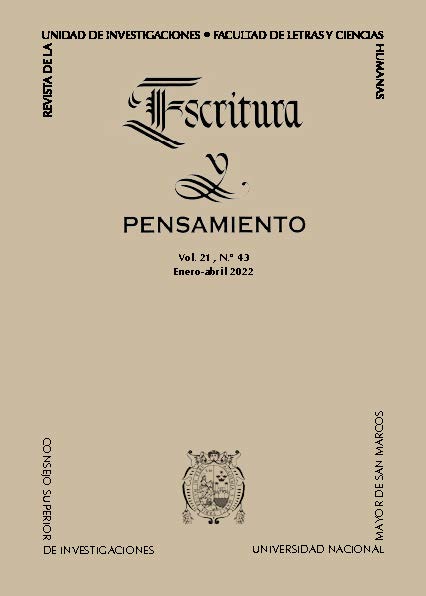Categories of modernity in Chimbotan novels
DOI:
https://doi.org/10.15381/escrypensam.v21i43.22790Keywords:
modernity, historiographic subjects, subjects of the story, categories of modernity, Chimbotan novelAbstract
The present work is a critical review of three novels that are based on Chimbotan modernity and that recreate its universe: El zorro de arriba y el zorro de abajo by José María Arguedas, Hombres de mar, by Óscar Colchado and Llora Corazón by Fernando Cueto. Its objective is to show and explain the basic categories that have determined modernity, such as migration, the idea of progress, identity, individualism, the rise and crisis of capitalism, utopia and centrality. The importance of the context as a generator of meanings and the systemic view will be decisive for drawing conclusions. For this, two texts will be discussed: “Intención historiográfica y sujetos de relato en Hombres de mar, de Óscar Colchado Lucio”, by Estefanía Peña and Mito y modernidad en “El zorro de arriba y el zorro de abajo” de José María Arguedas, by Henry Rivas, which show the relationship between the systemic and the narrative process of Chimbote. Likewise, the novel Llora Corazón by Fernando Cueto appears as a project of identity imprint, which follows the line of Arguedas and Colchado Lucio, of showing the emblems of modernity through the social remnants that are expressed in the characters and subthemes. In the same way, the historiographical subjects and the subjects of the story become important to explain that modernity.
References
Arguedas, J. (2013). El zorro de arriba y el zorro de abajo. Fondo Editorial de Nuevo Chimbote.
Elmore, P. (2015). Elmore, Peter. Los muros invisibles: Lima y la modernidad en la novela del siglo XX. Fondo editorial de la PUCP.
Colchado, L. (2011) Hombres de mar. Alfaguara.
Cueto, F. (2006) Llora corazón. Río Santa.
Fernández, M. (2013). La discusión modernidad/posmodernidad revisada. Fundíbulo ediciones.
Garvich, J. (2007). “Llora corazón” o la vida de Chimbote en toda su polifonía. Marea Cultural. http://mareacultural.blogspot.com/2007/09/llora-corazn-o-la-vida-de-la-ciudad-en.html
Mejía, J. (2019). Sociedad, individualismo y modernidad en el Perú. Sociologias, (27), 95-114. http://dx.doi.org/10.1590/15174522-02105014
Merino, R. (1994) Elmore, Peter. Los muros invisibles: Lima y la modernidad en la novela del siglo XX. Lexis: Revista de lingüística y literatura, 18 (1), 128-131. https://dialnet.unirioja.es/servlet/articulo?codigo=7033462
Morillo, A. (2015) Navegar por las Aguas del cosmos: La Visión Mítica en Hombres de mar, de Óscar Colchado Lucio. Cuadernos Literarios, 9 (12), 35-59. https://doi.org/10.35626/cl.12.2015.15
Ortega, J. (1999). Los Zorros de Arguedas: migraciones y fundaciones de la modernidad andina. Ciberayllu. https://andes.missouri.edu/andes/especiales/jozorros/jo_zorros2.html
Peña, S. (2017). Intención historiográfica y sujetos de relato en Hombres de mar, de Óscar Colchado Lucio. Desde el Sur, 9 (2), 317–336. https://revistas.cientifica.edu.pe/index.php/desdeelsur/article/view/359
Rancière, J. (2009). La palabra muda. Ensayo sobre las contradicciones de la literatura. Buenos Aires: Tierna Cadencia Editora.
Rivas, H. (2017). Mito y modernidad en “El zorro de arriba y el zorro de abajo” de José María Arguedas. [Tesis para optar el grado académico de Magíster en Literatura Peruana y Latinoamericana]. Universidad Nacional Mayor de San Marcos. Facultad de Letras y Ciencias Humanas. Unidad de Posgrado. https://cybertesis.unmsm.edu.pe/handle/20.500.12672/5901
Wagner, P. (2017). Progreso y modernidad: el problema con la autonomía. Sociología Histórica, (7), 95-120. https://revistas.um.es/sh/article/view/243631
Downloads
Published
Issue
Section
License
Copyright (c) 2022 Italo Roning Morales Viera

This work is licensed under a Creative Commons Attribution 4.0 International License.
AUTHORS RETAIN THEIR RIGHTS:
a. The authors retain their trademark and patent rights, and also over any process or procedure described in the article.
b. The authors retain the right to share, copy, distribute, execute and publicly communicate the article published in the Escritura y Pensamiento (for example, place it in an institutional repository or publish as part a book), with acknowledgment of its initial publication by Escritura y Pensamiento.
c. Authors retain the right to make a subsequent publication of their work, to use the article or any part of it (for example: a compilation of their work, lecture notes, thesis, or for a book), provided that they indicate the source of publication (authors of the work, journal, volume, number and date).





